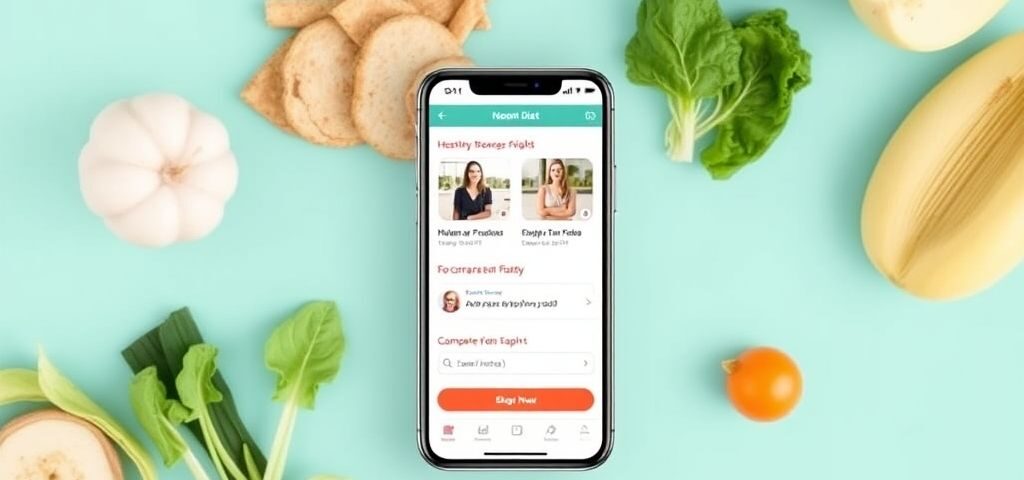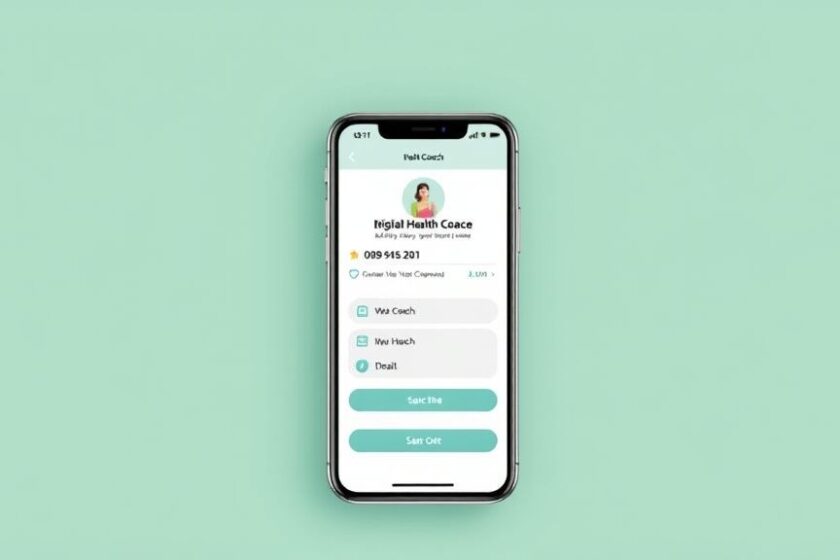Losing weight is rarely just about cutting calories or following a strict meal plan. For most people, it’s about breaking old habits, learning new ones, and finding support along the way. That’s where the Noom diet comes in. Instead of positioning itself as just another diet program, Noom markets itself as a digital health coach app — one that blends psychology, nutrition, and accountability to help users build sustainable lifestyle changes.
Unlike traditional plans that simply tell you what to eat, Noom acts like a pocket-sized health coach app, guiding you with daily lessons, habit-tracking tools, and personalized feedback. It’s designed to help you recognize patterns, understand the “why” behind your food choices, and shift behaviors in a way that feels manageable long term.
Combine technology with human coaching to create a smarter path toward healthy living. Whether your goal is sustainable weight loss, better nutrition, or simply improving your relationship with food, Noom aims to provide both the structure and flexibility to get there. We’ll explore how the Noom diet works, what science says about it, its costs and limitations, and whether it might be the right digital health coach for you.
What is the Noom Diet?
At its core, the Noom diet isn’t a traditional diet at all. Instead of prescribing strict food lists or banning entire food groups, it works through an app that functions as a digital health coach. The program is built on behavioral psychology, particularly cognitive behavioral therapy (CBT), to help users understand their eating habits and make lasting changes.
When you download the Noom app, you’re introduced to its signature food color system. Foods are categorized as green, yellow, or red — not to shame you, but to guide portion sizes and encourage balance. Green foods (like fruits, vegetables, and whole grains) are nutrient-dense and low in calories. Yellow foods (such as lean proteins and healthy fats) provide energy but should be eaten in moderation. Red foods (like sweets, fried items, or calorie-dense snacks) aren’t off-limits, but Noom encourages mindful consumption.
Beyond the color coding, the app delivers short daily lessons on topics like the psychology of eating, stress triggers, and habit formation. Users also get access to goal tracking, food logging, and, most importantly, coaching support. Each person is paired with a human coach and a peer group for accountability, making the app feel like a personal health coach app in your pocket.
The real difference between Noom and other diet programs is its focus on behavior change. Instead of quick fixes or temporary calorie cuts, Noom positions itself as a sustainable approach to weight management. It doesn’t just tell you what to eat — it helps you understand why you eat, offering tools that build awareness and resilience over time.
How the Digital Health Coach App Works
What makes Noom different from calorie-counting apps or rigid diet plans is the way it combines technology with coaching. From the moment you sign up, the Noom app works like a personalized digital health coach that adapts to your goals, preferences, and lifestyle.
Personalized onboarding
The process starts with a detailed questionnaire covering your weight history, activity level, food habits, and health goals. Based on your answers, Noom creates a tailored plan inside the health coach app, giving you a clear roadmap for the weeks ahead.
Food logging with guidance
Tracking meals is central to Noom. Instead of focusing only on calories, it uses the color-coded food system to highlight choices that support balance. Logging isn’t just about accountability — it’s about learning how food choices fit into your overall nutrition and lifestyle.
Daily lessons and habit training
Each day, the app delivers bite-sized lessons on topics like the psychology of eating, mindful choices, and habit formation. These micro-lessons are designed to shift the way you think about food, helping you move away from old dieting patterns and toward long-term behavior change.
Coaching and community
Noom pairs you with a human coach who checks in regularly, answers questions, and keeps you accountable. In addition, you join a peer support group within the digital health coach app, creating a sense of community and encouragement.
Tracking progress
The app tracks your weight, steps, and activity, integrating wellness metrics so you can see progress beyond just the scale. Over time, these data points help identify patterns and highlight achievements, keeping motivation high.
Scientific Evidence — Does Noom Work?
One of the biggest questions people ask before downloading any digital health coach app is simple: Does it actually work? With Noom, the answer appears to be yes for many users, though the strength of evidence varies.
Several observational studies have tracked Noom users over time. One large analysis published in Scientific Reports found that nearly 80% of active users lost weight while using the app, and those who logged meals consistently were the most successful. This supports a key principle of Noom: self-monitoring and accountability drive better outcomes.
What sets Noom apart from standard calorie trackers is its grounding in behavioral psychology. Instead of focusing only on food intake, it emphasizes nutrition education, habit formation, and the psychology of eating. By teaching users to identify emotional triggers and patterns, the app works more like a personal health coach than a quick-fix diet tool.
That said, experts also point out the limitations. While there’s strong real-world data, there are relatively few long-term randomized controlled trials comparing Noom directly against other diet plans like Weight Watchers or MyFitnessPal. This means we know Noom can be effective, but more independent research is needed to confirm its long-term benefits beyond weight loss — such as improvements in overall wellness or chronic disease risk factors.
Still, many dietitians view Noom positively because it promotes sustainable weight loss rather than extreme restriction. By combining food logging, coaching, and behavioral lessons, the app provides multiple touchpoints of support. For individuals who respond well to structure, accountability, and digital feedback, Noom can function as an effective digital health coach app to guide lifestyle change.
The evidence shows promise, especially for motivated users who engage with the program consistently, but like any health tool, Noom works best when combined with personal commitment and realistic expectations.
Pros of Using a Digital Health Coach App Like Noom
One of the biggest advantages of Noom is that it’s more than just another calorie tracker. As a digital health coach app, it combines technology with human support, creating a balance between guidance and flexibility.
Psychology-driven approach
Noom’s focus on behavior and the psychology of eating helps people recognize emotional triggers and develop healthier coping strategies. This makes it especially effective for anyone who struggles with stress eating or cravings.
Flexible food system
Unlike restrictive diets, Noom doesn’t forbid entire food groups. Its color-coded system encourages mindful eating while allowing you to enjoy all foods in moderation. This flexibility makes it easier to stick with the long term.
Coaching and accountability
Having a personal coach and peer group within the health coach app adds accountability, which research shows is key for sustainable weight loss. Users often find that regular check-ins keep motivation high.
Education and habit change
Daily lessons on topics like nutrition, portion control, and intuitive eating equip users with knowledge that lasts beyond the program. These micro-lessons transform Noom from a short-term diet into a lifestyle tool.
Together, these features make Noom feel like a supportive partner in your health journey — a digital coach that fits right in your pocket.
Cons and Risks
While Noom has plenty of strengths, no program is perfect. Like any digital health coach app, it comes with some limitations and risks you should know before signing up.
Cost can add up
One of the most common complaints is the price. Noom offers monthly and annual subscription options, but many users feel the app is more expensive than competitors like Weight Watchers or MyFitnessPal. Although you can often try a free trial, the ongoing Noom cost may be a barrier for some.
Coaching quality may vary
Noom provides access to a personal coach, but these are often trained support specialists rather than licensed dietitians. Some users find the coaching helpful, while others report that feedback feels generic. For those expecting a highly personalized experience, this can be a drawback.
Low-calorie targets
Several reviewers have noted that the app sometimes sets calorie goals that feel too restrictive. While this may work for short-term results, experts warn that overly low targets can undermine safe weight loss and sustainability.
Not suitable for everyone
Because Noom emphasizes food tracking, it may not be appropriate for people with current or past eating disorders. In fact, some health professionals caution that the daily logging could trigger disordered eating behaviors.
Noom Cost, Free Trial & What You Get
One of the first things people ask about Noom is: how much does it cost? As a digital health coach app, Noom is subscription-based, offering different pricing tiers depending on the length of your plan.
Most users start with a 7-day free trial. This gives you time to explore the app, check out the daily lessons, and connect with a coach before committing. After the trial, subscription costs typically range from about $60 per month to lower monthly rates if you sign up for a longer plan (such as 6 or 12 months).
So, what do you actually get for the price? A Noom subscription includes:
Access to a personal health coach for support and accountability.
Daily bite-sized lessons based on psychology and nutrition.
A color-coded food logging system that makes tracking intuitive.
Peer group support for motivation.
Tools for goal-setting and habit tracking.
When compared to the cost of in-person coaching or nutrition counseling, many find Noom to be a more affordable alternative. Still, it’s worth weighing the subscription fee against how much value you’ll realistically get from the app.
Noom’s Coaching & Support System
One of the biggest selling points of Noom is its built-in coaching and community support. Unlike a typical food tracker, this digital health coach app pairs you with a personal coach and connects you to a group of peers working toward similar health goals.
Personal coach: Each user is matched with a coach who encourages, answers questions, and helps set realistic goals. While coaches aren’t usually registered dietitians, they are trained in behavior change and habit formation. For many users, this ongoing accountability makes a huge difference in staying consistent.
Group support: Beyond one-on-one coaching, Noom also places users in small peer groups. Here, members share wins, challenges, and tips — creating a sense of community. This helps reduce the isolation that sometimes comes with lifestyle changes.
Accountability & habit tracking: Daily check-ins, reminders, and progress reports help users stay on track. The app reinforces new habits through repetition and positive reinforcement, which research shows is essential for lasting behavior change.
While some users wish coaching felt more personalized, others find the guidance and support system motivating. Overall, Noom’s coaching model turns the app into more than just a tracker — it feels like having a digital health coach by your side.
How Noom Works: The Color-Coded Food System
Noom sets itself apart from traditional diets with its unique color-coded food system. Instead of labeling foods as strictly “good” or “bad,” this digital health coach app groups foods into three categories — green, yellow, and red — based on calorie density and nutritional value.
Green foods: These are the most nutrient-dense and lowest in calories, such as vegetables, fruits, and whole grains. Noom encourages users to fill most of their plate with these options.
Yellow foods: These fall in the middle, including lean proteins, beans, and dairy. They’re healthy but should be eaten in moderation.
Red foods: Higher in calories and lower in nutrient density, red foods include items like desserts, fried foods, and processed snacks. Instead of banning them, Noom recommends mindful portion control.
This system helps users shift their focus from restriction to mindful eating. By teaching portion control and encouraging balance it makes it easier to enjoy all foods without guilt.
Another key difference is flexibility. Unlike many diets that cut out entire food groups, Noom allows users to include their favorite meals while still making progress. This approach not only supports sustainable weight loss but also encourages healthier long-term eating habits.
The Psychology Behind Noom
At its core, Noom isn’t just about counting calories — it’s about changing the way you think about food. As a digital health coach app, it uses psychology and behavioral science to help users build long-term, sustainable habits.
One of Noom’s key tools is its use of cognitive-behavioral therapy (CBT) principles. CBT is a proven psychological approach that helps people identify thought patterns that drive behaviors. For example, you might learn to recognize how stress leads to late-night snacking or how certain environments trigger overeating. Once identified, the app provides strategies to break these patterns and replace them with healthier responses.
Daily lessons guide users through concepts like mindful eating, self-reflection, and setting achievable goals. These lessons are short and easy to digest, but they gradually build into a strong foundation for lasting lifestyle change.
Another strength is its focus on behavior change, not quick fixes. By addressing the “why” behind eating habits, Noom goes deeper than most diet apps. Instead of relying solely on willpower, users develop new coping strategies that align with their long-term goals.
This psychology-driven framework makes Noom stand out from other health tools. Rather than offering a temporary diet, the app positions itself as a digital health coach that helps you reshape habits, rethink food choices, and ultimately build a healthier relationship with eating.
Who Is Noom Best For?
Noom isn’t designed for everyone, but it can be highly effective for people who want more than a quick-fix diet. As a digital health coach app, it’s best suited for individuals looking to make lasting lifestyle changes with the help of structured guidance and accountability.
Those seeking sustainable weight loss
If you’ve tried restrictive diets before and found them hard to maintain, Noom’s psychology-driven approach offers a refreshing alternative. It focuses on gradual changes that build long-term results.
People interested in mindful eating
Noom works well for those who want to understand their relationship with food. Its daily lessons and color-coded food system encourage awareness rather than strict restriction.
Busy professionals
Because the app is mobile-based, it’s convenient for users with a hectic lifestyle. Tracking meals, receiving coaching, and accessing lessons can all be done in just a few minutes per day.
Anyone who values guidance and accountability
Noom’s coaching and group support are ideal for people who thrive with encouragement and structure.
Noom is best for those who want a supportive, psychology-driven tool to guide them toward healthier habits — making it much more than just another diet app, but a digital health coach in your pocket.
Who Should Avoid It?
While Noom has helped millions, it’s not the right fit for everyone. Like any digital health coach app, it has limitations that may make it unsuitable in certain situations.
Individuals with eating disorders
Because Noom requires daily food logging and calorie tracking, it can be triggering for people with a history of disordered eating. Experts often recommend professional, in-person care for those needing specialized support.
Those needing medical supervision
If you have complex health conditions — such as diabetes requiring insulin, heart disease, or other chronic illnesses — you may need a program overseen by a doctor or registered dietitian. While Noom provides general guidance, it’s not a substitute for personalized medical care.
People who dislike tracking
Noom involves consistent logging of meals, weight, and activity. For some, this level of detail feels restrictive or time-consuming, which can lead to frustration or early dropout.
Anyone seeking rapid weight loss
Noom emphasizes gradual habit change and sustainable weight management, not crash dieting. If you’re looking for fast results, you may find the pace too slow.
Noom works best for people open to lifestyle change. But if you need medical oversight or struggle with eating disorders, this digital health coach app may not be the safest choice.
User Reviews & Results
When it comes to real-world feedback, Noom has a mix of glowing reviews and constructive criticism. Many users praise the program for helping them lose weight and, more importantly, keep it off. They credit the app’s psychology-based lessons and accountability features for making it feel less like a diet and more like a lifestyle shift.
Positive reviews often highlight the role of coaching. Users appreciate having someone check in regularly, saying it feels like having a digital health coach app that keeps them motivated and on track. Others enjoy the supportive peer groups, which encourage them during challenging weeks.
The color-coded food system also receives high marks. Many people report that it simplifies decision-making and helps them practice mindful eating without feeling deprived. These small, consistent changes often add up to significant results over time.
That said, not every review is positive. Some users feel the coaching is too generic, while others find the daily logging tedious. A recurring concern is cost — several reviewers feel the subscription is pricey compared to free alternatives.
In terms of outcomes, studies and testimonials suggest that dedicated users often lose 7–15 pounds in the first few months, with many reporting better energy, improved eating habits, and greater confidence in making healthy choices.
Overall, user experiences show that Noom can be a powerful digital health coach app for those committed to the process — but like any tool, results depend on consistency and effort.
Noom vs Other Diets & Apps
When choosing a weight loss or wellness program, it’s natural to compare options. Noom stands out because it positions itself not just as a tracker, but as a digital health coach app built around psychology and habit change.
Noom vs. Weight Watchers (WW):
Both programs emphasize flexibility and allow all foods in moderation. WW uses a points system, while Noom uses a color-coded food approach. Many users find Noom’s lessons on behavior and psychology more educational, while WW often appeals to those who like in-person workshops or a more community-driven approach.
Noom vs. MyFitnessPal:
MyFitnessPal is primarily a calorie and activity tracker. It has an extensive food database and works well for people who simply want to log meals. Noom, however, adds structured coaching, daily lessons, and psychological tools, which can make it feel more like a health coach app than a tracker.
Noom vs. Traditional Diets:
Unlike keto, paleo, or other restrictive diets, Noom doesn’t cut out food groups. Instead, it emphasizes sustainable weight loss through portion control and mindful eating. This makes it more adaptable for long-term use.
Noom vs. Other Digital Coaching Apps:
While apps like Fitbit or Lose It! provide helpful tracking tools, they lack Noom’s focus on the psychology of eating. Noom’s biggest differentiator is its emphasis on behavior change — teaching users how to identify triggers, reframe thought patterns, and build healthier habits.
Noom’s edge lies in combining education, accountability, and coaching into one platform. For people looking for more than just numbers, it delivers the experience of having a digital health coach in your pocket.
Conclusion
Noom isn’t just another diet app — it’s designed to act as a digital health coach app that guides you toward lasting lifestyle change. By combining psychology, mindful eating, and personalized support, it helps users not only lose weight but also understand the “why” behind their habits.
Its biggest strengths lie in its psychology-driven lessons, color-coded food system, and built-in accountability through coaching and group support. These features make it especially valuable for people seeking sustainable weight loss and healthier long-term habits.
That said, it’s not the right fit for everyone. The subscription cost can feel steep, and the daily tracking may not work for those who dislike logging food. People with eating disorders or complex medical needs should also seek professional guidance before starting.
FAQs:
- Is Noom really effective for weight loss?
Yes, many users report losing weight with Noom, often between 7 and 15 pounds in the first few months. Its strength lies in addressing the psychology behind eating and encouraging sustainable lifestyle changes, rather than quick fixes. That’s why it’s considered more than a diet — it’s a digital health coach app that builds long-term habits. - How much does Noom cost after the trial?
After the 7-day free trial, subscriptions typically cost around $60 per month, with discounts for longer commitments. While the price is higher thanthat of free trackers, users pay for coaching, daily lessons, and structured guidance. - What makes Noom different from other apps?
Unlike calorie-only trackers, Noom combines behavioral science, habit change strategies, and accountability. It’s designed to act like a health coach app, guiding you through education, reflection, and support. - Can I eat what I want on Noom?
Yes. No foods are banned. Instead, the app uses a color-coded system to encourage mindful eating and portion control. You can still enjoy your favorite foods — just in balance. - Is Noom safe?
For most people, yes. However, those with eating disorders or medical conditions that require strict dietary supervision should consult a healthcare provider before using the app.



